Ever since making his cinematic debut in 1997’s “Mrs. Brown,” Gerard Butler has caught audiences’ attention with his instantly recognizable accent, dashing good looks, and rugged masculinity.
He’s not just a tough guy — he’s a man. To that end, many of his most well-known movies have cast him as a rugged creature of action (“300,” “Olympus Has Fallen”), a romantic lead (“Dear Frankie,” “One More Kiss”), or some combination of the two. He’s not a disposable leading man, however — Butler has taken on some surprising parts over the course of his decades-long career, proving his versatility as an actor.
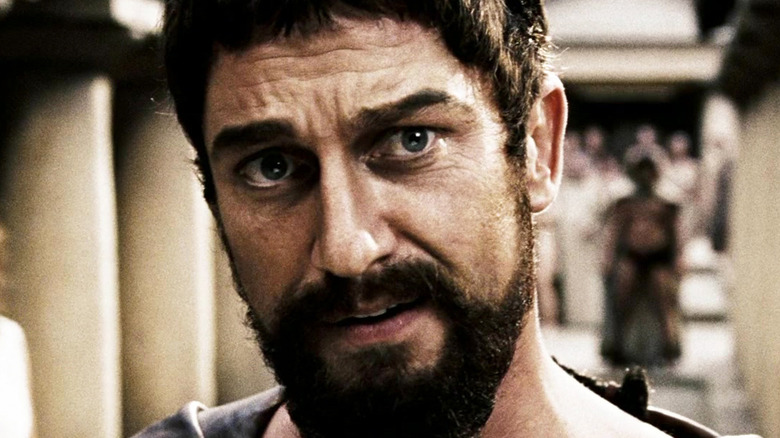
That being said, not every one of his movies is a towering cinematic achievement. Butler’s career runs the gamut, from widely-panned disasters to some of the most acclaimed films of the modern era. To better appreciate Gerard Butler’s work, we’re ranking every single one of his movies from worst to best, according to Rotten Tomatoes score. Take note: This list does not include animated appearances, so while all three “How to Train Your Dragon” movies scored north of 90%, they will not be represented in this list. After all, what’s the point of watching a Gerard Butler movie if you can’t gaze into his big blue eyes?
Playing for Keeps
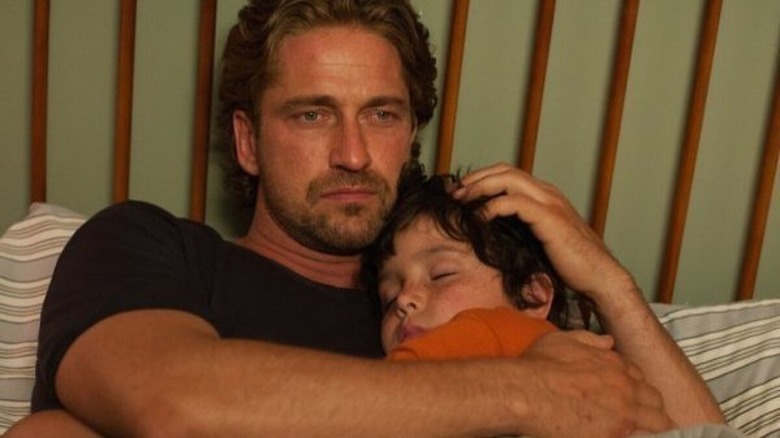
FilmDistrict
According to Rotten Tomatoes, the absolute worst film of Gerard Butler’s career is “Playing for Keeps,” a 2012 mess that could best be described as “Rom-Com: The Movie.” There is nothing remotely imaginative here: It’s just a squad of pretty people (including Jessica Biel, Uma Thurman, and Catherine Zeta-Jones) going through slightly romantic, slightly dramatic situations that feel like the first draft of an ultimately rejected episode of “This Is Us.”
Butler plays George, a retired soccer player looking to start a new career as a television sportscaster, reconnect with his young son, and win back his ex-wife, who is currently seeing another man played by a significantly less famous actor (sorry, James Tupper). Based on that last sentence, you probably know exactly how this movie ends. Audiences largely avoided the film, which flopped hard at the box office. Director Gabriele Muccino called it a “painful adventure” in an interview with Variety, and blamed its critical and commercial failure on the film’s many producers, each of whom pulled the movie in a different direction. It seems “Playing for Keeps” fell victim to the old problem of having too many cooks in the kitchen.
The Bounty Hunter
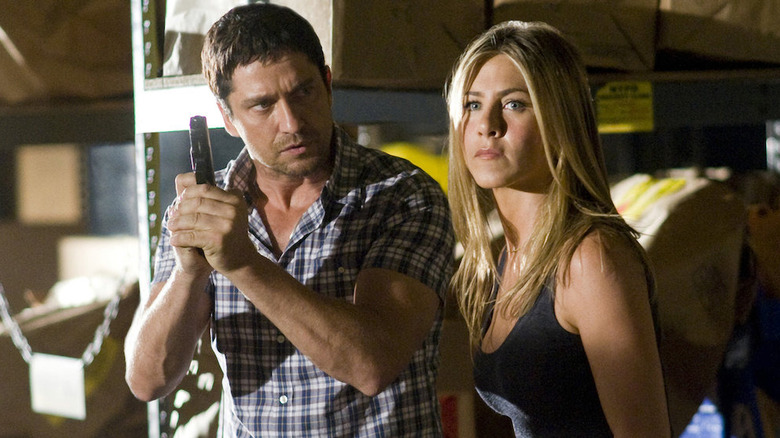
Sony
Like so many leading men, Gerard Butler’s bread and butter has usually fallen into one of two realms: macho action or romantic comedy. “The Bounty Hunter,” released in 2010, attempts to combine the two, resulting in a rom-buddy-action-com. This is a novel idea, but it fails to stick the landing as anything more than instantly disposable entertainment.
Butler plays a former cop who now works as a bounty hunter. Jennifer Aniston plays his ex-wife, a reporter who jumps bail while investigating a story. When Butler is asked to hunt her down, he jumps at the opportunity. But their reunion quickly leads to a standard action scenario, with low-stakes PG-13 gun battles and flat attempts at witty banter.
Critics were unkind, citing the lack of chemistry between Butler and Aniston, but audiences jumped at the chance to see these two beautiful people together. “The Bounty Hunter” finished its run with a healthy box office take of $136 million worldwide, more than triple its budget.
Timeline
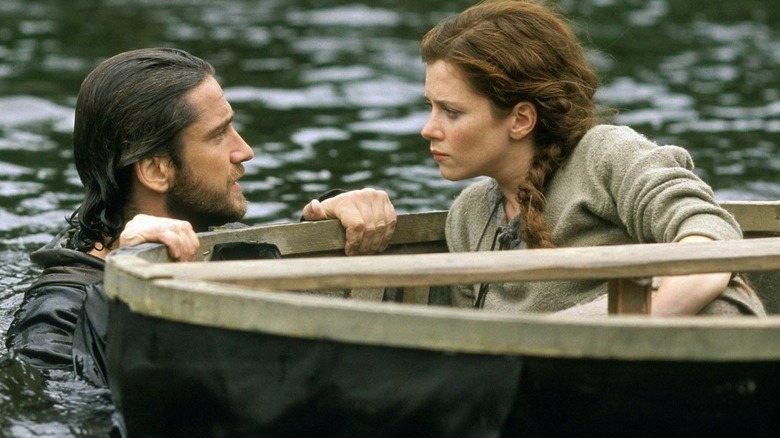
Paramount Pictures
Based on the 1999 Michael Crichton novel of the same name, “Timeline” boasts an all-star cast including Paul Walker, Billy Connolly, Neal McDonough, and Frances O’Connor. It’s a good thing they’re all so beautiful — this flick’s screenplay doesn’t have much going on beyond its basic time-travel plot. Director Richard Donner (“Lethal Weapon”) clearly had fun with the big action sequences, which are visually exciting and easily the best part of the film. But everything else is either corny or half-baked, and always completely disposable.
Still, for viewers looking for nothing more than exciting action sequences starring hunky actors, “Timeline” is a reasonable choice. Plus, Butler really gets to ham it up as a medieval enthusiast who was made for the era of chainmail and swords, rather than internet connectivity and motor vehicles. His romance with Lady Claire (Anna Friel) is particularly swoon-worthy for fans of Butler’s soft side.
The Ugly Truth
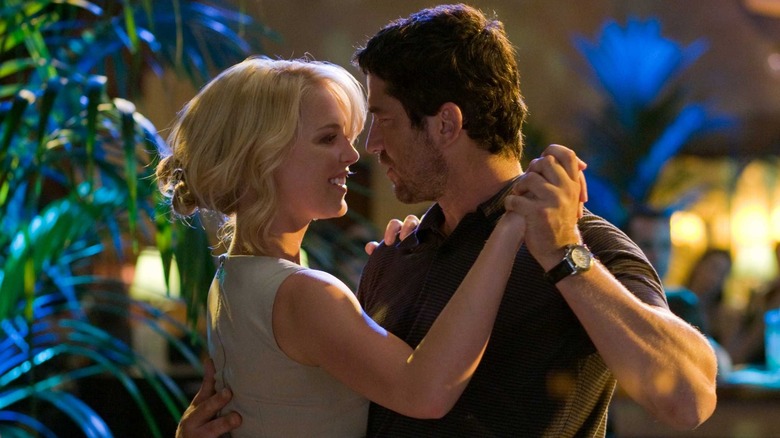
Sony
“The Ugly Truth” is an odd case. Katherine Heigl and Gerard Butler are wonderfully cast as mismatched romantic partners who inevitably fall in love — but they do so in one of the most boring and dreadfully unfunny romantic comedies ever made. The humor in “The Ugly Truth” is so rudimentary and uninspired and the script so shallow that it barely even feels like a real movie. Perhaps in an attempt to liven things up, the filmmakers went with an R rating instead of the customary PG-13, but it doesn’t make much of a difference. The ugly truth about “The Ugly Truth” is that it simply isn’t very good.
Then again, sometimes audiences want nothing more than corny nonsense from a date night movie. “The Ugly Truth” made an astounding $321 million worldwide, further cementing Butler’s status as an A-list star. Heigl, already a mainstay in the genre, reached impressive new heights through this success — you could reasonably consider it a high point of her lengthy career.
Gods of Egypt
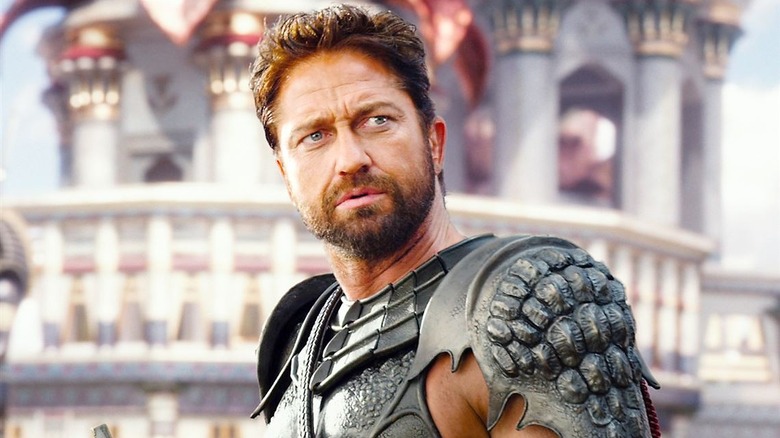
Summit Entertainment
It’s not so much that Gerard Butler is miscast as an Egyptian god — it’s that all of the white actors are miscast in “Gods of Egypt,” a would-be blockbuster from 2016. The racial implications of the film’s bizarre casting decisions led to the studio apologizing for the film before it was even released. Even so, director Alex Proyas insisted the film is merely inspired by Egyptian mythology, rather than being a true historical epic, and that it is “about as reality-based as ‘Star Wars.'”
Unfortunately, unlike “Star Wars,” there’s little in “Gods of Egypt” that’s entertaining or imaginative. The CGI is mediocre for a film where the CGI is clearly the main draw, and the plot feels like a rejected episode of a forgotten 1980s cartoon. “London Has Fallen,” released just a week after “Gods of Egypt,” serves as a brutal comparison: Despite having a budget less than half of the one afforded “Gods of Egypt,” “London Has Fallen” outgrossed it by $50 million at the worldwide box office and helped launch a lucrative franchise. Meanwhile, “Gods of Egypt” has already been forgotten by all but the most devoted Butler enthusiasts, who likely enjoy it for its dubious “so-bad-it’s-good” merits.
A Family Man
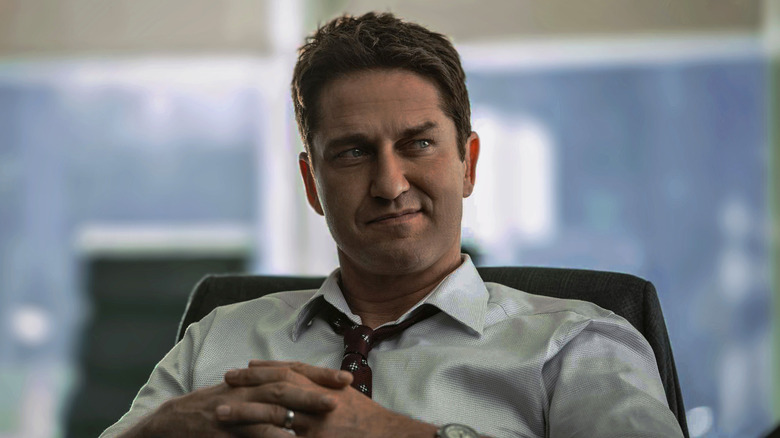
Vertical Entertainment
If this movie seems unfamiliar, you may know it by a different title: “A Family Man” is also known as “The Headhunter’s Calling” and “A Definitely Maybe,” which is not to be confused with “Definitely, Maybe.” Regardless of the film’s title, it doesn’t have much going for it beyond its cast, which includes Willem Dafoe, Alison Brie, and Alfred Molina. Butler plays a hardworking businessman who doesn’t spend enough time with his family. His struggle to achieve work/life balance is further hampered by a prospective promotion at his company — but when his young son is diagnosed with cancer, Butler has to decide what’s really important in life.
Schmaltzy to a fault, “A Family Man” feels like a slightly-more-prestigious alternative to a made-for-cable Hallmark movie. It also marks the directorial debut of Mark Williams, a writer-producer best known for co-creating the hit Netflix series “Ozark.” It seems he and Butler got along, since they collaborated once more on 2021’s “Copshop,” directed by Joe Carnahan.
Geostorm
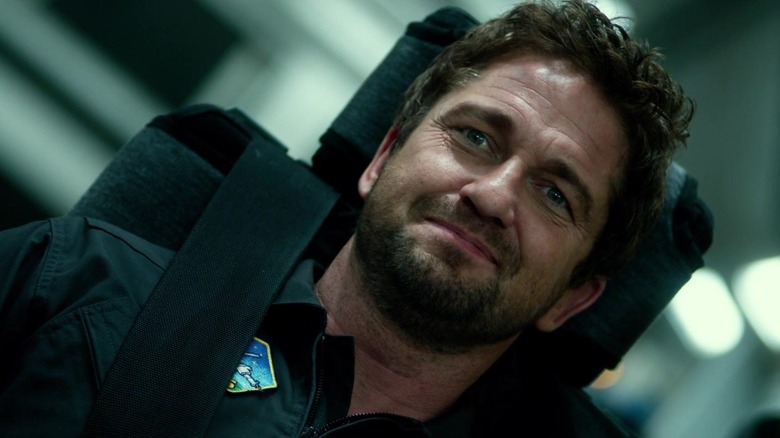
Warner Brothers Pictures
Dean Devlin has worked as a producer on many of Roland Emmerich’s biggest movies, from “Independence Day” to “Godzilla.” In 2017, he released his directorial debut, “Geostorm,” starring Gerard Butler. In any given disaster movie, scenes of outrageous environmental destruction are always the main draw, but there’s usually something else to keep the audience entertained. In “Geostorm,” this is not the case. Gerard Butler is such a non-entity in this film, his character could be played by anyone. The only actor who even appears to be trying is Ed Harris, who at least gets to chew some scenery as a devilish villain.
While the CGI destruction has its merits as eye candy, the most interesting part of “Geostorm” is its behind-the-scenes story. According to The Hollywood Reporter, the first cut of the film was so poor, the studio had to spend $15 million on reshoots to get it into a releasable state. And then the film bombed at the box office anyway. Devlin bounced back with his next film, 2018’s “Bad Samaritan”: While not a box office success, it earned significantly stronger reviews than “Geostorm.” At this rate, Devlin should direct a genuinely fantastic film any day now … but we’re not going to hold our breath.

Miramax Films
By all accounts, “Dracula 2000” is not a good movie. but it has nonetheless attained a decent cult following, due to its turn-of-the-millennium cinematic sensibilities and deliciously hammy performances from its entire cast. And boy, what a cast: In addition to Christopher Plummer as the elder statesman Abraham Van Helsing, this film includes Jeri Ryan, Jonny Lee Miller, and Nathan Fillion, among others. All are primped to be as ham-fistedly sexy as possible, but none are sexier than Gerard Butler as the man himself, Count Dracula.
This film ups the eroticism compared to previous incarnations of the story, to what some might call parodic levels — but really, that’s all part of the fun. “Dracula 2000” doesn’t follow any rules of drama or horror, which results in something like 1995’s “Jade” inexplicably mixed with a corny horror movie from the 1980s, wrapped in the superficial trappings of “The Matrix.” It’s bizarre and nigh-incomprehensible, but it certainly captures the viewer’s attention for the duration of its 99-minute runtime. Plus, the entire premise is “sexy Gerard Butler is sexy.” What more could anyone ask for?
Lara Croft: Tomb Raider –The Cradle of Life
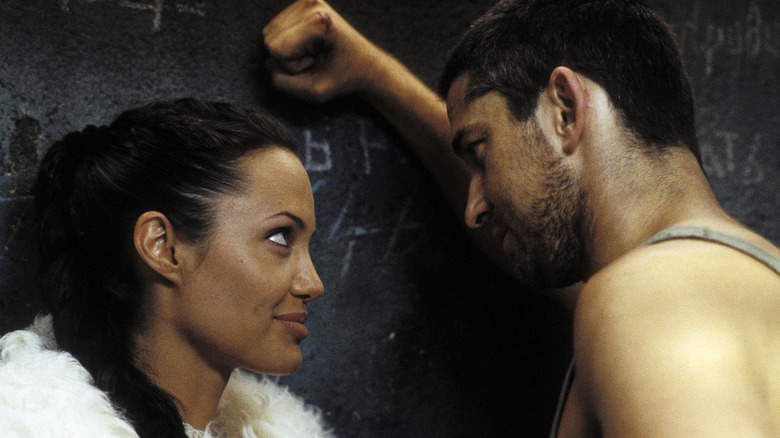
Paramount Pictures
Angelina Jolie’s breakthrough to super-stardom came in the form of 2001’s “Lara Croft: Tomb Raider,” based on the popular video game series. The film was a surprise box office hit, grossing a stellar $274 million worldwide. This success led to a 2003 sequel, “Lara Croft: Tomb Raider — The Cradle of Life.” In the first film, Jolie is paired with a hunky young Daniel Craig — in the sequel, she’s paired with a hunky young Gerard Butler. He plays Terry Sheridan, a fellow treasure hunter with a moral compass that doesn’t quite align with Lara’s. Their uneasy alliance is actually one of the strongest points of “The Cradle of Life”: It alternately crumbles and is reinforced over the course of the film, ultimately leading to a climactic showdown.
As is often the case, however, this sequel failed to set the world on fire like the original did. Critics and audiences were mostly dismissive of “The Cradle of Life,” and the result was a financial disappointment. It’s often blamed for ending the series until the Alicia Vikander reboot in 2018, but that’s not really the case — a third film was in development, but when Angelina Jolie herself decided not to return, the series was put on ice.
P.S. I Love You
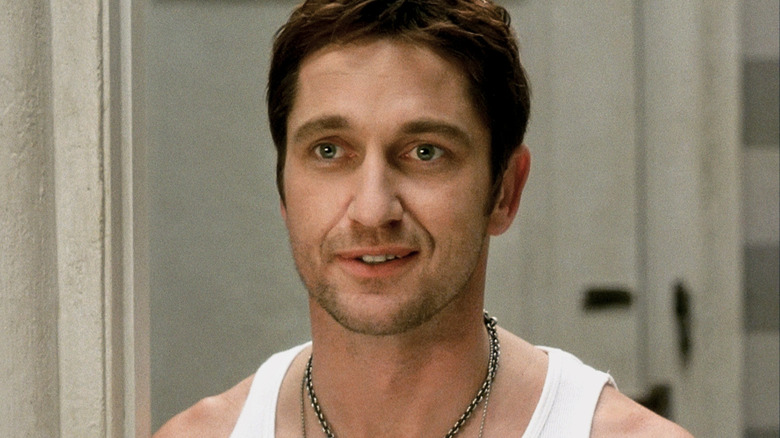
Warner Brothers
Sometimes, critics and audiences simply aren’t on the same page. “P.S. I Love You” was roundly trashed by critics at the time of its 2007 release, but audiences ate it up, to the tune of $156 million worldwide. The flick’s Tomatometer score sits at a lowly 25%, while its audience score stands at a whopping 80%. There’s just something about sincere schmaltz that gets audiences to cheer, even if it can’t penetrate the cynical membrane surrounding the heart of a cold-blooded critic.
Hilary Swank stars as a woman whose husband recently passed away. Butler plays the husband, who exists mostly in flashbacks. When he’s diagnosed with a terminal brain tumor, he arranges to have his wife sent on a series of adventures, in the hopes that his post-mortem messages will help her move on from his death and start a new chapter in her life. It’s contrived and a little ridiculous, but also genuinely heartwarming. For anyone who has lost a loved one, the thought that they’re still out there, somehow looking after them is inspiring. “P.S. I Love You” taps into that universal emotional wellspring, and no amount of overwriting can get in the way of it.
The Game of Their Lives
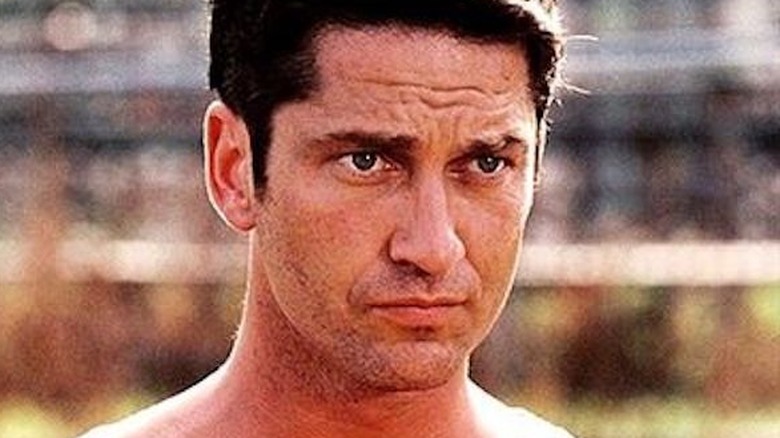
IFC Films
David Anspaugh made his feature-length directorial debut with “Hoosiers,” widely considered to be one of the greatest sports movies of all time. He also directed “Rudy,” another timeless classic of the genre. Unfortunately, the third time was not the charm, as his third sports drama, “The Game of Their Lives,” does not live up to its predecessors. In fact, it bombed with critics and audiences alike.
The forgettable film is inspired by 1950’s World Cup soccer match between the United States and England. The English team were clear frontrunners to win, but the United States shocked the world with a nail-biting 1-0 victory. Even though the United States didn’t go on to win the World Cup, their victory over the English is still considered to be one of the most surprising upsets in FIFA history.
Too bad the match couldn’t be chronicled in a better movie. The characters who crowd “The Game of Their Lives,” all of whom are based on real people, feel like cardboard cutouts designed to check the basic “underdog” boxes. The film’s meager budget makes the whole affair look like a cheap imitation of a better movie. What results is the ultimate in generic “inspirational sports flick” entertainment.
Law Abiding Citizen
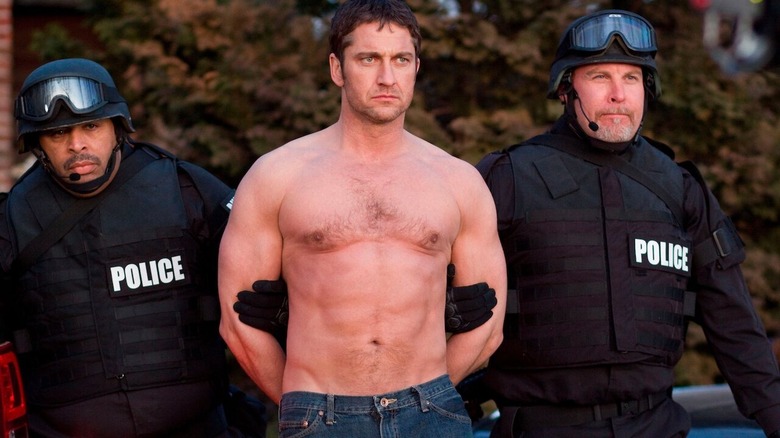
Overture Films
“Law Abiding Citizen” combines the gore of “Saw” with the vigilante sensibilities of “Death Wish” to create a unique hybrid of righteous violence and philosophizing. Butler stars as Clyde Shelton, a retired CIA assassination expert whose wife and daughter are brutally murdered in a random home invasion. Frustratingly, the attorney assigned to the case (Jamie Foxx) strikes a deal with one of the killers, resulting in a light sentence. Shelton proceeds to spend a full decade planning his revenge — not just on the killers, but on the entire justice system.
While critics were turned off by this film’s grim morality and fondness for boundary-pushing violence, audiences were far more receptive. The film’s core message is a vivid one: The law must maintain the spirit of justice as thoroughly as it obeys its own technicality-ridden rules. It goes so far as to suggest that exploiting loopholes to maintain a status quo is no different from breaking the law itself — a theme the public is very much into, apparently.
Machine Gun Preacher
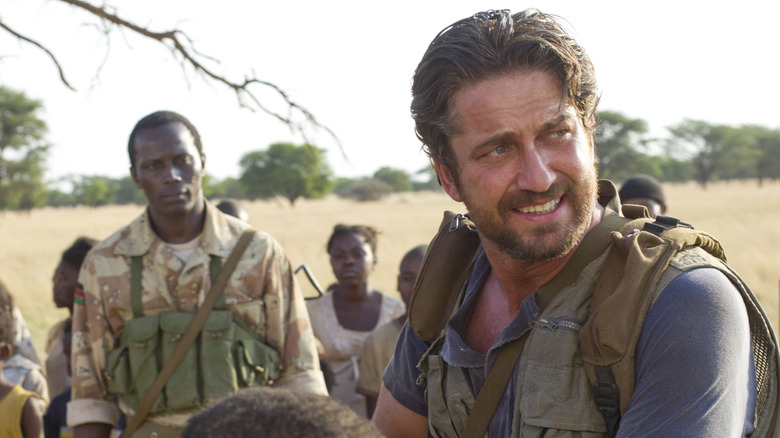
Relativity Media
Based on Sam Childers’ book, “Another Man’s War,” “Machine Gun Preacher” stars Gerard Butler as Childers, a biker gang member who becomes a Christian and dedicates his life to rescuing children in South Sudan. Though some of Childers’ real-life claims have come under scrutiny from outlets like Vanity Fair, they sure do make for an inspirational film. Butler shines as the character, a flawed misanthrope who does what he can to earn the Lord’s salvation.
“Machine Gun Preacher” was a critical and commercial bomb when it was first released. One wonders if this might be because it’s far from the pulpy romp its title suggests, instead offering a character study about faith, extremism, and redemption instead. It is, however, a great choice for those who wish to see Butler’s range: He does a fantastic job channeling the anger, serenity, and fanaticism that come with devotion to a righteous cause like saving children in a war-torn region.
London Has Fallen
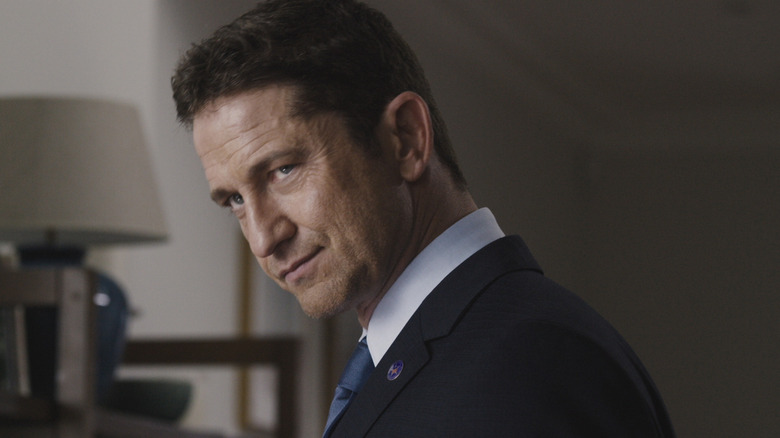
Focus Features
What “London Has Fallen” lacks in subtlety it makes up for with kinetic action and macho spectacle. This 2016 sequel to 2013’s “Olympus Has Fallen” sees Gerard Butler’s Mike Banning shoot bad guys and save the day — the bread and butter of blockbusters, in other words. That wasn’t enough for the critics, but audiences were pleased, netting the flick $205 million at the box office.
The story begins with a terror attack on various world leaders gathered in London. As soon as the explosions begin, the momentum never lets up: “London Has Fallen” is non-stop adrenaline channeled into plenty of gory, R-rated headshots. Moreover, the chemistry between Butler and his co-star Aaron Eckhart, who plays the president Banning protects, is as strong as ever. The whole film feels less like a post-9/11 terror-sploitation flick than it does a throwback to the glory days of 1980s action. It’s far from a cinematic masterpiece, but it delivers enough crowd-pleasing thrills to satisfy audiences with nothing better to do on a Friday night.
Gamer
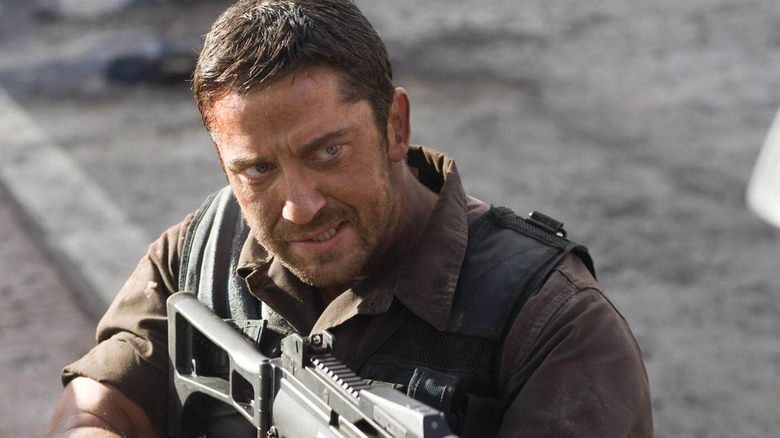
Lionsgate
There’s a certain magic inherent to the films of writer-director duo Mark Neveldine and Brian Taylor. Much of it stems from the way they openly flout the rules of filmmaking while creating absurd spectacles like “Crank” and “Ghost Rider: Spirit of Vengeance.” Love them or hate them, nobody else makes movies like they do. That uniqueness extends to 2009’s “Gamer.”
Set in a sci-fi dystopia where video game players control actual people in a violent deathmatch called “Slayers,” “Gamer” follows Tillman (Butler), a death row inmate used as an player avatar. A cold-blooded killer, he discovers he can use his martial prowess to take the fight to Ken Castle (Michael C. Hall), the creator of the game who has plans for world domination. It’s ridiculous, but it’s also a great vehicle for some loud and in-your-face action scenes. While Butler is the top-billed performer, Hall steals the show as Castle, an over-the-top villain who would feel right at home in a Roger Moore “James Bond” movie — and we mean that in a good way.
Chasing Mavericks
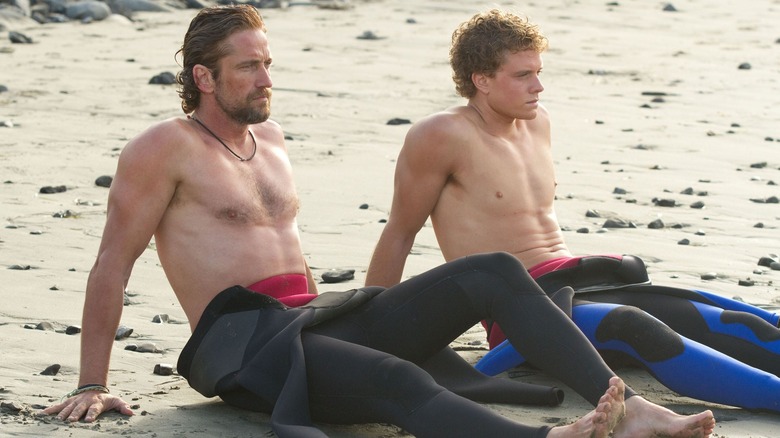
20th Century Studios
The short life of surfer Jay Moriarity is chronicled in 2012’s “Chasing Mavericks.” The Mavericks in the title refers to the famous — and dangerous — surfing spot in Northern California, as well as the nature of people who seek adrenaline and adventure through physical challenges. Jonny Weston stars as Moriarty, while Gerard Butler plays his friend and mentor, Frosty Hesson.
The film was a major bomb, which is a shame, as it’s a kind-hearted tribute to the late Moriarty and his immortal spirit of adventure. The surfing sequences are also a joy to behold, to the point that they eclipse the film’s lesser moments. “Chasing Mavericks” ended up being director Curtis Hanson’s last film: As the New York Times reported, he died in 2016 at the age of 71. Though it’ll doubtlessly remain far less celebrated than work like “L.A. Confidential” and “8 Mile,” “Chasing Mavericks” is a fine note for a career to end on.
The Phantom of the Opera
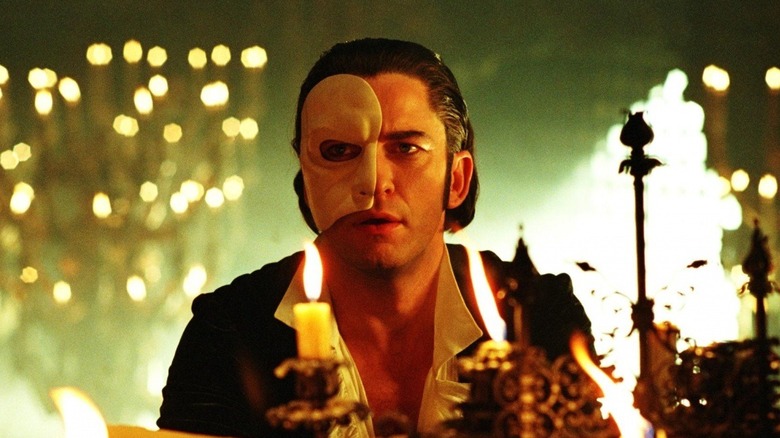
Warner Brothers
Gerard Butler was a dark horse choice for the title role in 2004’s “The Phantom of the Opera.” While Butler sang in a band in his younger days, he doesn’t have the kind of Broadway pedigree many believe a role like the Phantom requires. Nevertheless, the filmmakers believed in him, and the result speaks — or sings — for itself. Butler’s Phantom is a scorned and sensitive creature who takes his frustrations out on the (mostly) innocent denizens of the opera he haunts. Only Christine (Emmy Rossum), a beautiful young soprano, is spared his wrath. Though the Phantom is a terrifying figure to most, Christine perceives him as her Angel of Music … until his anger targets her childhood sweetheart.
While “The Phantom of the Opera” failed to impress the critics, it made a decent $154 million at the global box office and was nominated for three Academy Awards, including Best Cinematography. Indeed, the film is still visually dazzling years after its debut.
Hunter Killer
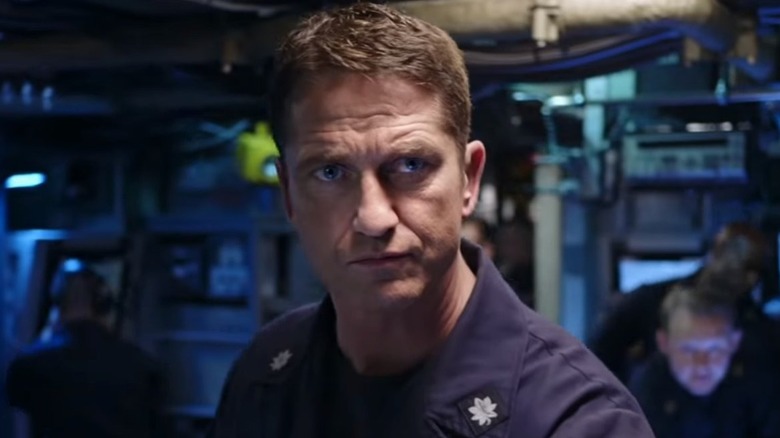
Lionsgate
As Gerard Butler lamented to Screen Rant, most of his lines were cut from 1997’s “Tomorrow Never Dies.” One day, he vowed, he’d play a proper role in a nautical-themed action flick. “Hunter Killer” delivers on that solemn oath. A largely by-the-numbers military thriller, it nevertheless entertains with a winning combination of tough-guy action and strong performances from its ensemble cast. Butler stars as a submarine captain who becomes embroiled in a plot to start a war between the United States and Russia. The action is split between underwater sequences of submarine warfare, on-foot missions by Navy SEALs, and military tacticians trying to figure out how to prevent an all-out war.
“Hunter Killer” doesn’t really bring anything new to the table, but it has heart and some truly pulse-pounding thrills. It also marks one of Michael Nyqvist’s final performances. Of working with him, Butler said, “It was one of the best experiences I’ve ever had with an actor.” Indeed, their chemistry as submarine captains forced to share a bridge is the best part of the movie, and one of the film’s few innovations within the “sub movie” genre.
Angel Has Fallen
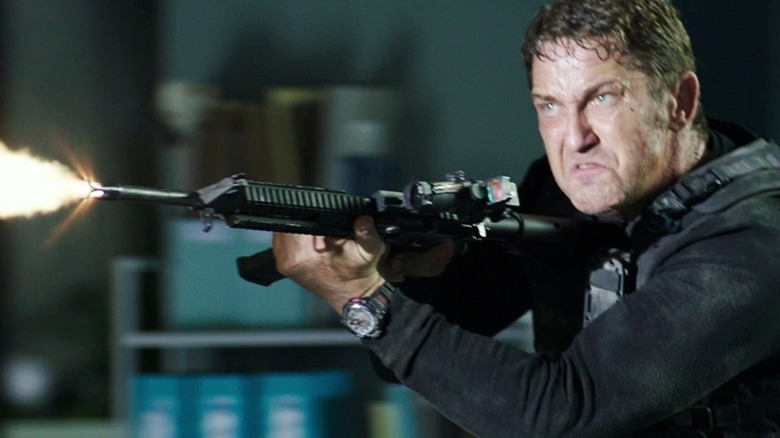
Lionsgate
The third entry in the “Has Fallen” series might be the best, since it maintains the R-rated sensibilities of its predecessors without taking itself too seriously. It also gets a boost from two of its supporting cast members. The first is Nick Nolte, who plays Gerard Butler’s father, a Vietnam veteran turned anti-government survivalist. He’s the source of the film’s funniest lines and biggest explosions. The second is Danny Huston, who plays Butler’s former commanding officer. His role marks the first time the “Has Fallen” series has given its hero a truly personal antagonist. The entire film builds up to their climactic showdown, which doesn’t disappoint: Huston and Butler engage in a John Woo-esque run-and-gun shootout before slashing at each other in a close-quarters knife fight.
All that said, “Angel Has Fallen” was not a hit with the critics. But few fans are likely to care. This series delivers high-octane good times, led by reliably rollicking performances from Butler in classic action-hero mode. “Angel Has Fallen” might not win any new devotees, but it entertains those who are already committed.
Den of Thieves
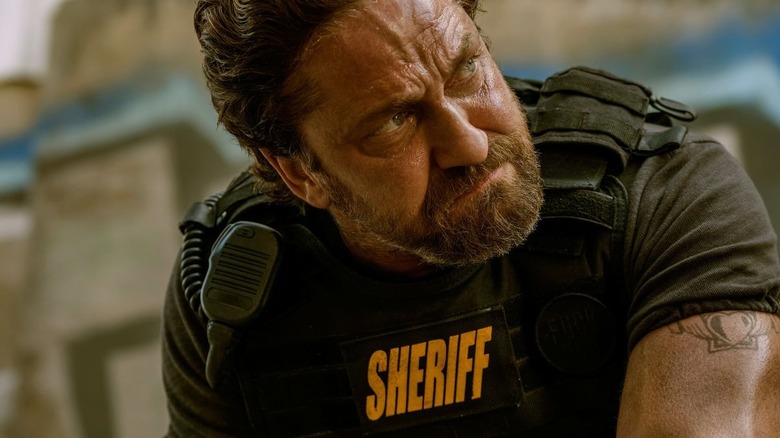
STX Films
“Den of Thieves” sees Butler star as Big Nick, a tough and jaded cop obsessed with bringing down a group of bank robbers. As heist films go, it’s not innovative or surprising, but it does feature strong acting from its impressive cast, which includes Pablo Schreiber, 50 Cent, and O’Shea Jackson Jr. Butler is especially intense: His seething rage gives all of his scenes an extra layer of menace. Big Nick is someone who would have been better off as a gunslinger in the Old West, rather than a lawman in the supposedly more civilized 21st century — he’s most comfortable when the bullets start flying.
“Den of Thieves” was a modest box office success, and, according to Deadline, a sequel is in the works. Writer-director Christian Gudegast is set to return alongside Butler and the other cast members whose characters survived the first film.
Reign of Fire
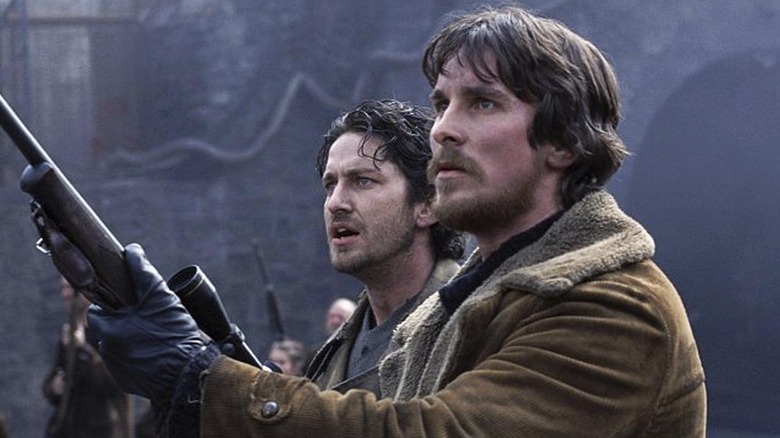
Buena Vista
“Reign of Fire” was dismissed by most critics when it premiered in 2002, but this derision has since given way to recognition of the film’s sheer awesomeness. Directed by frequent “X-Files” collaborator Rob Bowman, “Reign of Fire” is set in a post-apocalyptic future where humans have been all but wiped out by the new dominant species on the planet: dragons. The film succeeds due to how seriously it takes its admittedly absurd premise. While there are spots of humor here and there, it’s all character-driven, and lacks the B-movie sensibilities one might expect. Instead, it’s focused on Matthew McConaughey, Christian Bale, and Gerard Butler as they try to ensure the survival of the human race.
Though not everyone jives with this film’s unique approach, its CGI dragons are an undeniably incredible cinematic feat. If nothing else, it’s worth watching just to see McConaughey take a flying leap at a gigantic lizard armed with nothing but his guts and an axe.
Shooters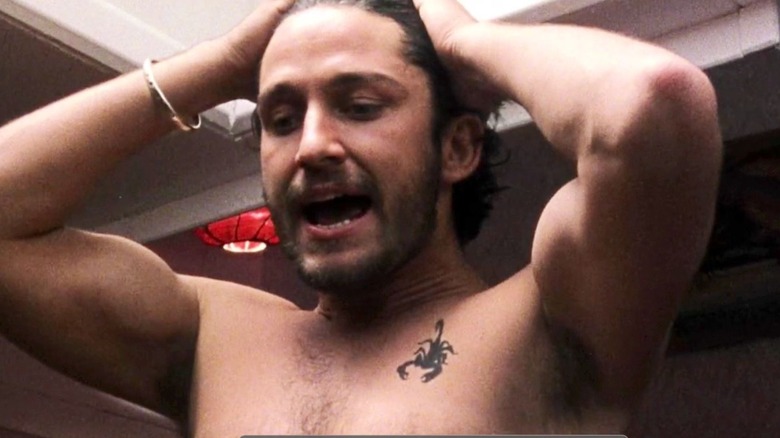
Media Cooperation One
This little-seen crime thriller isn’t a total disaster, but it’s clearly a shoestring production by newbie filmmakers trying to do the best they can. The few critics who saw “Shooters” weren’t crazy about it — Reel Film Reviews described it as a cheap Guy Ritchie knockoff – but if that’s what you’re looking for, there are far worse options out there.
By 2002, Butler was not a household name, though he did have a handful of credits under his belt, including his eyebrow-raising role in “Dracula 2000.” Butler and co-writer/star Andrew Howard previously appeared together in 1999’s “The Cherry Orchard,” which makes one wonder if they struck up a friendship that led to Butler’s appearance in “Shooters,” or if it was just a jolly coincidence. Either way, both actors would go on to better things, with Howard playing particularly fiendish villains in “Hell on Wheels” and “Agents of S.H.I.E.L.D.” Meanwhile, co-director Colin Teague has since worked on prestigious BBC shows like “Doctor Who,” “Torchwood,” and “The Sarah Jane Adventures,” among others.
One More Kiss
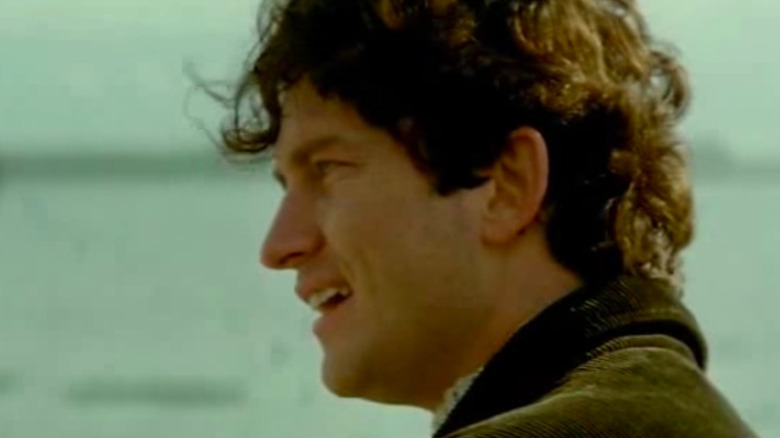
The Mob Film Company
“One More Kiss” didn’t make enough of a splash in the United States to merit an official Tomatometer score, but it does hold a middle-of-the-road audience score. This Scottish film stars Valerie Edmond as a woman who basically ran away from home to pursue a successful career in the United States. After she’s diagnosed with terminal cancer, she returns home to make amends with her father (James Cosmo) and her ex-boyfriend (Gerard Butler). He’s since married another woman, but he agrees to serve as her companion during her final days. His wife is less than thrilled about the situation, but that’s what makes the film a romantic drama.
Most mainstream audiences (especially in the United States) don’t even know about this film. Still, the few who have seen it can vouch for its dramatic sensibilities, as well as the strong performances its leads bring to the table. James Cosmo particularly stands out as a grief-stricken man bracing himself against the impending loss of his daughter.
Fast Food
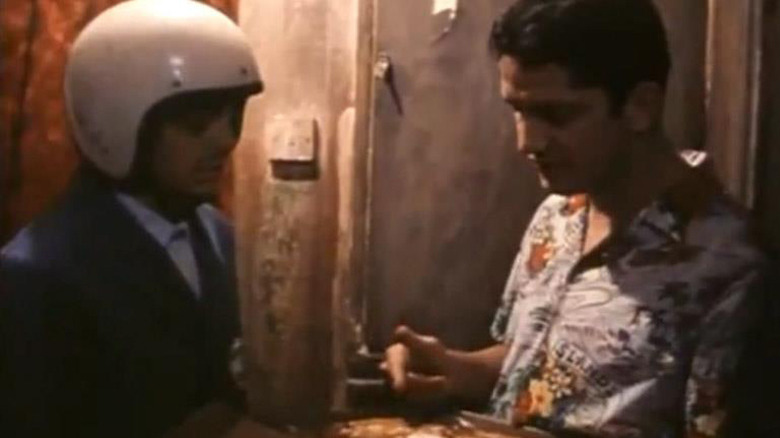
Twin Pictures
This 1999 film contains one of Butler’s first leading roles. “Fast Food” follows Benny (Douglas Henshall), a man trying to adjust to the various changes that have come to his hometown and his friends. And then it becomes a heist movie, because every British movie made at the turn of the millennium had to borrow from the Guy Ritchie playbook.
As Variety’s review demonstrates, critics enjoyed the film’s character-driven first half more than its derivative back end. Sadly, the film failed to make a splash: It’s so little known, it has no Rotten Tomatoes stats at all. “Fast Food” is written and directed by Stewart Sugg, who went on to find considerably more success directing sports documentaries. His recent work chronicles the lives and accomplishments of such figures as Jade Jones, Kenny Dalglish, and Shane Williams, to name a few.
Beowulf & Grendel
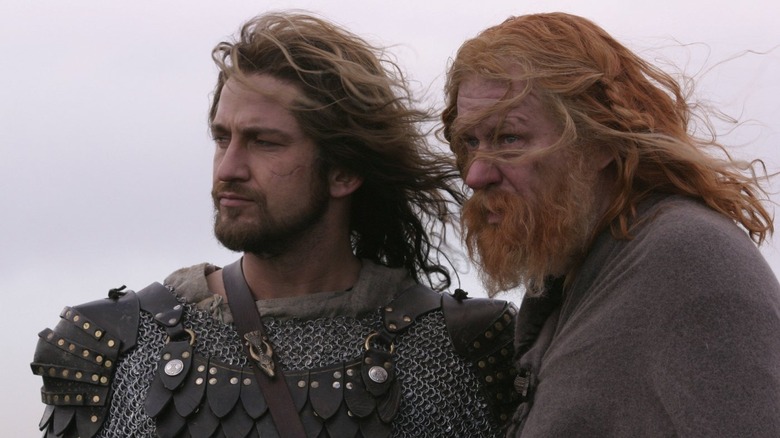
Truly Indie
Not to be confused with Robert Zemeckis’ 2007 “Beowulf” film, “Beowulf & Grendel” is based on the same core mythology, but tries to tell a more realistic version of the story. Well, as realistic as can be expected from a story about a man fighting a cave creature born of a giant monster-lady. Had things gone differently, “Beowulf & Grendel” might be fondly remembered as a unique take on a classic tale. Unfortunately, the best parts of “Beowulf & Grendel” are found in an entirely different movie: The 2006 documentary “Wrath of Gods,” which chronicles the film’s disastrous production. Things went so off the rails, the filmmakers believed the production was genuinely cursed. Watching “Wrath of Gods,” it’s hard to argue with their logic.
Regardless of all the behind-the-scenes madness, “Beowulf & Grendel” does have a singular saving grace in its setting. The film was shot in Iceland, and makes tremendous use of the location, showcasing the natural wonders of the landscape in many of its scenes. If only it was a nature documentary, and not a pseudo-historical epic.
Harrison’s Flowers
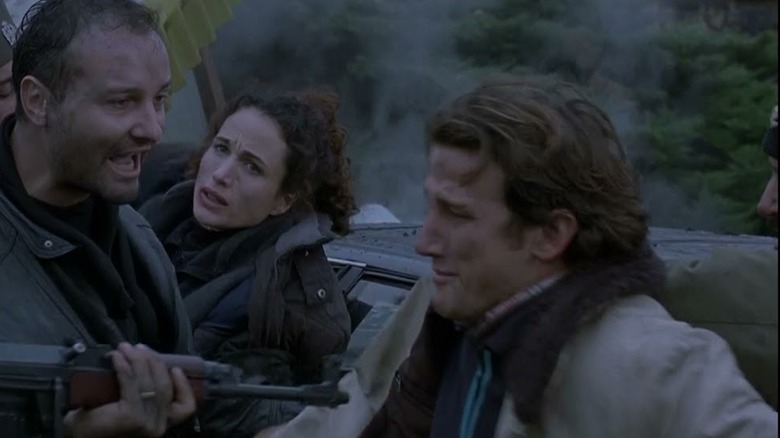
Universal
Butler doesn’t play a large role in “Harrison’s Flowers”: He’s just one part of an ensemble that includes Andie MacDowell, Brendan Gleeson, Adrien Brody, and David Strathairn, who plays the title character, photojournalist Harrison Lloyd. When Harrison goes missing in war-torn Yugoslavia, his wife (MacDowell) follows in his footsteps in an attempt to bring him home. Along the way, she experiences the horrors of war first-hand.
“Harrison’s Flowers” is more about shining a light on a real-life conflict than it is about the personal lives of its characters. This would work better if the movie didn’t have the equation backwards: The war and its cruel consumption of human life too often take a backseat to the sentimentality of its fictional leads. As Roger Ebert noted in his review, this film is caught between its disinterest in the conflict’s roots and its desire to explore brutality. What results is vaguely interesting, but deeply confused.
Olympus Has Fallen
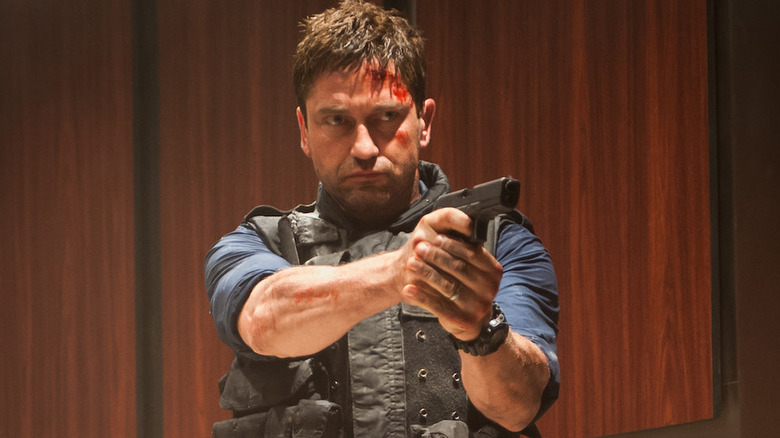
FilmDistrict
“Olympus Has Fallen” introduces audiences to Mike Banning, Gerard Butler’s heroic Secret Service agent, who is forced into action when North Korean terrorists lay siege to the White House and hold the president and many of the government’s top figures hostage. The film doesn’t start off on the correct foot: Its opening terror attack on D.C. comes across as a bit tasteless, rather than tragic and horrific. Poor CGI doesn’t help matters, as its conspicuous nature makes the action feel cartoonish, rather than harrowing.
However, once the story shifts to the intimate setting of the White House, “Olympus Has Fallen” becomes much more successful. Banning takes down the bad guys one at a time, almost always confirming his kills with a grisly headshot. This trend is taken to its logical extreme in the film’s final fight, which gets positively gruesome. Though it has a rocky start, this action thriller ultimately nails its landing and sets the stage for Butler’s very own action franchise.
Nim’s Island
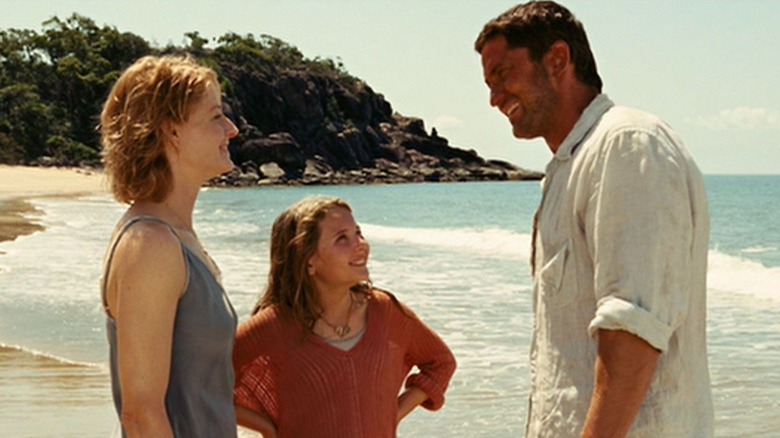
20th Century Fox
A 2008 film starring Abigail Breslin, Jodie Foster, and Gerard Butler, “Nim’s Island” is one of Butler’s few family films. Based on the novel by Wendy Orr, it follows the father-daughter adventures of Jack and Nim, who move to an isolated South Pacific island following the death of Nim’s mother. The film is full of beautiful island scenery and family-friendly antics, without ever falling into the trap of becoming infantile. It’s aimed at younger audiences, sure, but it’s not afraid to be smart enough to keep parents and older siblings engaged.
“Nim’s Island” was a surprise hit, grossing a solid $100 million at the global box office. A sequel, “Return to Nim’s Island,” followed in 2013, but this significantly smaller production recast the entire film. Matthew Lillard is unable to fill Gerard Butler’s shoes, literally or metaphorically … but it does have an inexplicable appearance from John Waters, which has to be worth something. Though the sequel is a completely forgettable Hallmark movie (literally — it made its American debut on the Hallmark Channel), that doesn’t detract from the magic of the original.
The Cherry Orchard
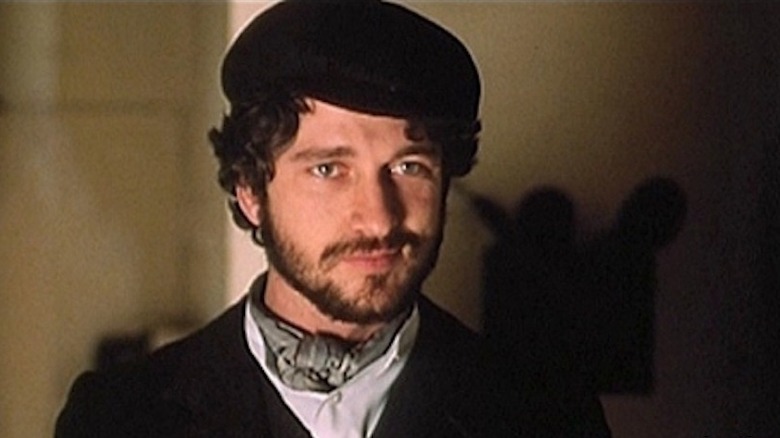
Kino International
Based on the 1904 play by Anton Chekov, “The Cherry Orchard” introduced the world to Gerard Butler’s romantic side. While the story revolves around Charlotte Rampling’s character, a fallen aristocrat forced to sell all of her possessions in order to pay off debts, the only thing many viewers remember from the movie are the scenes in which Gerard Butler attempts to woo Dunyasha (Melanie Lynskey). And that’s saying a lot, considering, again, that the top-billed performer in the film is Charlotte Rampling, one of the most celebrated stars of the modern era.
“The Cherry Orchard” was the last play Anton Chekov completed before his death in 1904. Likewise, this 1999 film version was the final effort from director Michael Cacoyannis (“Zorba the Greek,” “Electra”) before his death in 2011.
RocknRolla
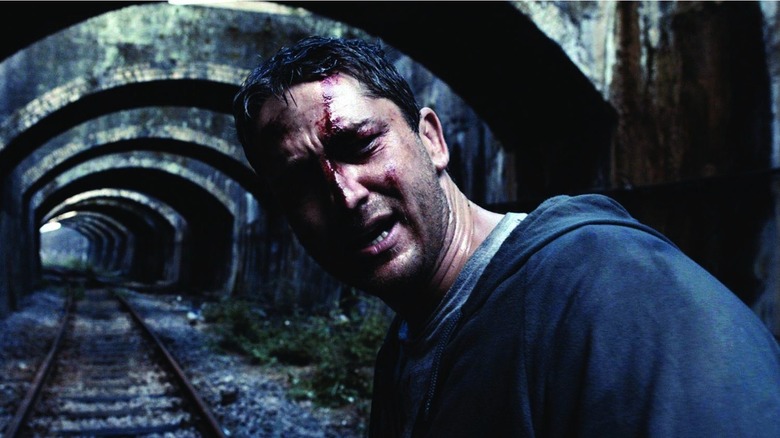
Warner Brothers
It’s honestly a bit surprising that it took until 2008’s “RocknRolla” for Gerard Butler to appear in a Guy Ritchie movie. Fortunately, they got together just in time: “RocknRolla” would be the last of Ritchie’s bread-and-butter gangster movies until 2019’s “The Gentlemen.”
Like most of Ritchie’s gangster fare, “RocknRolla” follows a gang of criminals who act very cool and engage in general mischief, from slow dancing at a gay bar to being captured and tortured by Russian Spetsnaz thugs. It’s delightfully weird and never stops long enough for the audience to question the insanity. You either get on the ride and appreciate the momentum, or you find another movie to watch.
Ritchie planned to continue the story of “RocknRolla” in a sequel, but became side-tracked by the success of “Sherlock Holmes” and his subsequent career as a big-budget blockbuster director. Now that he’s working in the crime thriller genre once more, maybe it’s time for him to pick up that baton and return to the world of “RocknRolla.”
Shattered
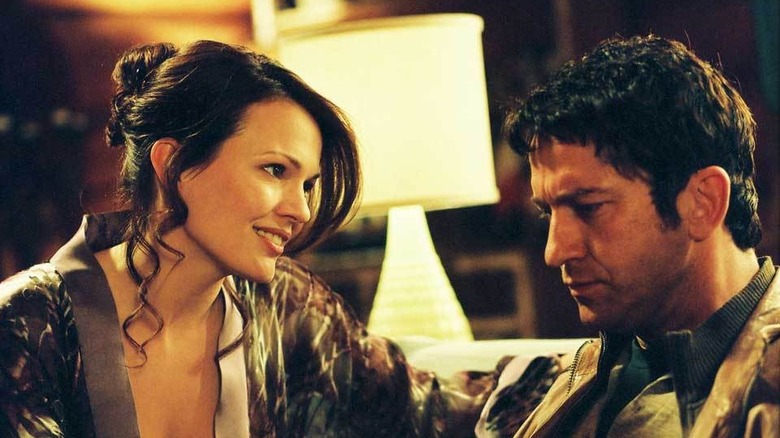
Lionsgate
Also known as “Butterfly on a Wheel,” “Shattered” is an engaging thriller that completely falls off the rails in its final act. Butler and Maria Bello play a married couple whose lives are effectively held hostage by a mysterious stranger (Pierce Brosnan), who orders them to follow his every command, lest he murder their child.
The couple is forced to systematically destroy their own lives for no apparent reason … or so it seems. The film’s twist ending reveals the true intent behind this torture — but it also kills its narrative tension. It’s nice to see Brosnan in such a menacing role, but unfortunately, it arrives in a movie that feels like a middle-of-the-road episode of “Alfred Hitchcock Presents.”
Notably, “butterfly on a wheel” refers to the foolishness of strapping an insect to a complex torture device: Any satisfaction gained is not worth the effort expended. That means the title of this film refers to the absurdity of its own premise. If nothing else, that’s a gutsy move.
300
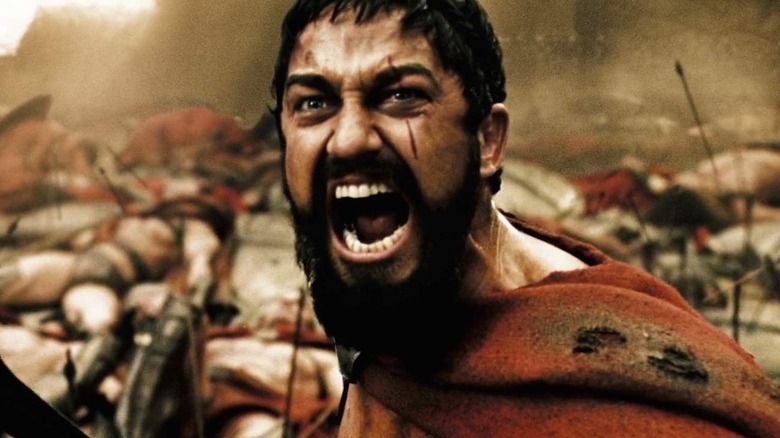
Warner Brothers
No matter what Gerard Butler does with his life, he will probably be remembered for one thing: playing King Leonidas in Zack Snyder’s “300.” In a film defined by spectacular visuals, Butler still manages to stand out as the hyper-masculine king of Sparta, who leads 300 warriors against thousands of Persian troops during the Battle of Thermopylae.
“300” presents a highly fictionalized version of that real-life battle, with the Persians employing inhuman monsters in their ranks, as well as other fantasy elements. It’s not accurate — and it doesn’t care. This is a movie a whole lot more interested in being awesome than faithful.
“300” was an unexpected box office smash, instantly propelling Snyder to the top of Hollywood’s directorial A-list and fully cementing Butler’s status as a superstar. The film’s kinetic action sequences hold up remarkably well today, while the sight of Gerard Butler leading a team of oiled-up tough guys with six-pack abs and sheer ferocity … well, some fashions never go out of style.
Greenland
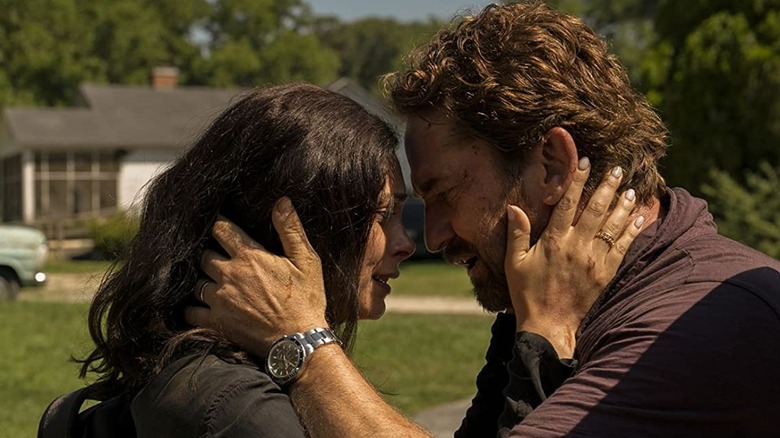
STX Films
If “Geostorm” represents one side of the disaster movie spectrum, then “Greenland” represents the other, in that it’s actually a good movie. Quite good, in fact! What sets it apart from similar movies that offer mere spectacle is the fact that “Greenland” focuses on its characters first and computer-generated excitement second.
Directed by Butler’s “Angel Has Fallen” collaborator Ric Roman Waugh, “Greenland” follows a family as they try to make their way to a plane that will carry them to Greenland, where Cold War-era nuclear shelters will allow a precious few to survive an asteroid apocalypse.
Released in the early days of the COVID-19 pandemic, “Greenland” did not get a theatrical release in the United States, but was nevertheless financially successful enough to get a sequel. “Greenland: Migration” is currently in development at STX, which purchased the film at Cannes for a whopping $75 million.
Dear Frankie
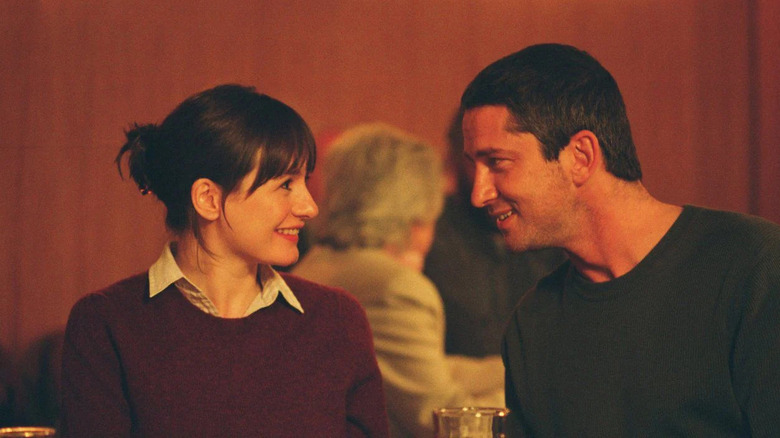
Pathé Distribution
Gerard Butler plays a mysterious stranger in 2004’s “Dear Frankie,” a gripping romantic drama about Lizzie (Emily Mortimer) and her son Frankie (Jack McElhone), who was rendered deaf following a beating by his father. While on the run, Frankie maintains a pen-pal relationship with his abusive patriarch.
However, the letters he receives are actually written by his mother, who has concocted a story to protect Frankie from the sad truth of their circumstances. Eventually, Lizzie hires Butler’s unnamed stranger to roleplay as Frankie’s father, giving the boy the experience he’s always wanted.
In lesser hands, “Dear Frankie” could have been a disaster. But thanks to director Shona Auerbach, “Dear Frankie” is never anything less than sweet and sincere. Butler excels as a man who understands the responsibility he’s been gifted, while Mortimer’s passion is heartbreaking to witness.
Her final confrontation with the vile ex-husband is an especially poignant moment. Young Jack McElhone also does a fantastic job as a boy far wiser than he appears to be. “Dear Frankie” is a beautiful film, and, like Gerard Butler himself, a timeless British treasure.
Copshop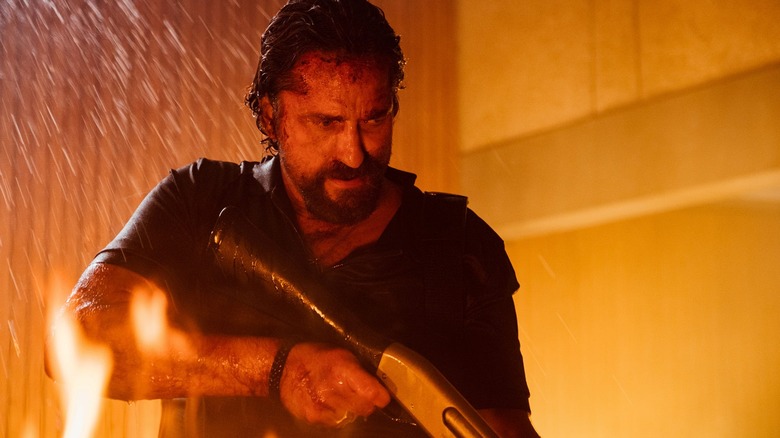
Open Road Films
“Copshop” is one of Gerard Butler’s latest films. It’s also one of his best. Directed by genre master Joe Carnahan (“Narc,” “Stretch”), “Copshop” follows a hitman (Butler) chasing down a target (Frank Grillo), who gets himself arrested by a rookie cop (Alexis Louder) in order to achieve safety within a police station.
However, the hitman pretends to be drunk in order to get arrested and get inside the same station … and then another hitman (Toby Huss) shows up. This inevitably leads to all hell breaking loose.
“Copshop” is smart and stylish, boasting pop art sensibilities and a keen focus on characterization. Once the bullets start flying, the viewer actually cares whether or not the characters live or die … and a great many of them die.
The film wears its 1970s influences on its sleeve, with the opening scene even being set to the iconic score from the first “Dirty Harry” sequel, “Magnum Force.” The chemistry between its leads is palpable, and Gerard Butler is absolutely perfect as the honorable-but-ruthless hitman. Here’s hoping “Copshop” is just the first of many collaborations between Butler and Carnahan.
The Vanishing
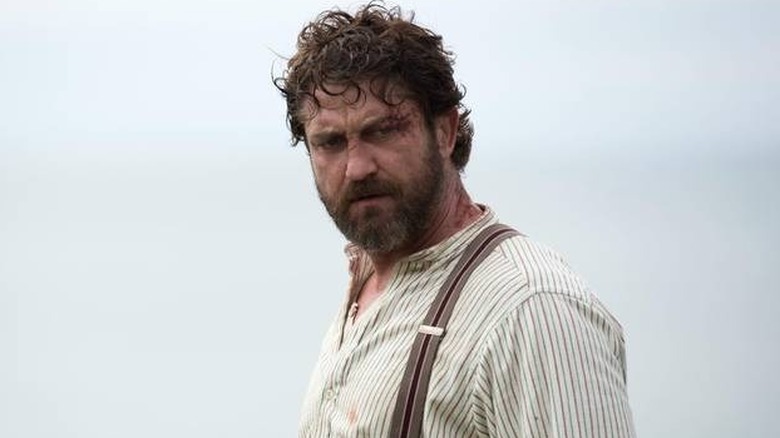
Lionsgate
“The Vanishing” is a slow-burn psychological thriller about three lighthouse keepers who lose their grip on sanity while succumbing to mercury poisoning and their own dark impulses. It’s not as avant-garde as 2019’s “The Lighthouse,” which you might be tempted to compare it to. But it’s also interested in telling a very different type of story, so comparisons, while inevitable, are reductive.
Though technically inspired by a true story, “The Vanishing” is completely fictional. It had an extremely limited release in the United States, which is unfortunate, since it seems like the type of film with potential to become a word-of-mouth hit at the box office. Regardless, its a nice feather in Butler’s cap: He acts far outside of his usual range as a kind-hearted family man slowly driven to madness and murder. The film’s final scene, in which he realizes that he has taken his soul to a dark place from which it can never return, simply must be seen to be believed.
Mrs. Brown
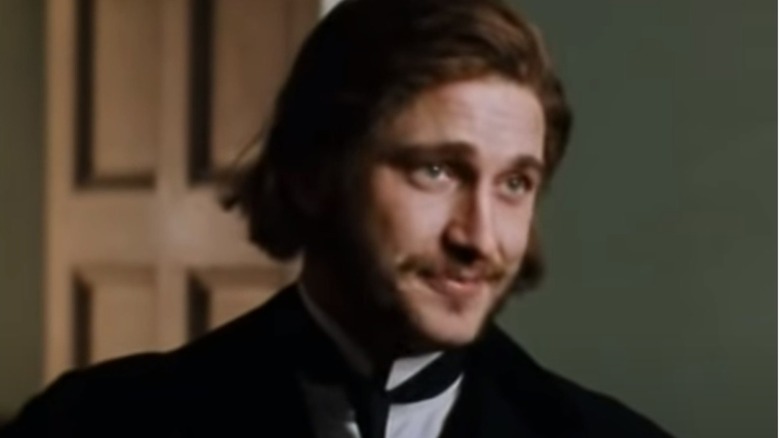
Miramax Films
Butler made his cinematic debut in 1997’s “Mrs. Brown,” which stars Dame Judi Dench as Queen Victoria. The film revolves around the relationship between the Queen and her servant, John Brown, played by Billy Connolly. In real life, the term “Mrs. Brown” was used as a derisive nickname for the Queen, insinuating she was in a romantic relationship with someone of lower social status than herself.
Butler plays Brown’s son, Archie, who went on to become a royal servant himself. Though this is a small role, the movie itself is still highly regarded as a skillful, affecting drama featuring a constellation of top-notch talent. There are certainly worse movies to make one’s debut in.
In an interesting bit of cinematic trivia, “Mrs. Brown” is the first of two 1997 films Butler appeared in with Judi Dench and Geoffrey Palmer. He also had a small role in the James Bond film “Tomorrow Never Dies” as a seaman aboard the HMS Devonshire. That doomed sailor only has one line, but it’s still a noteworthy piece of film history for 007 scholars and Butler enthusiasts alike.
Coriolanus
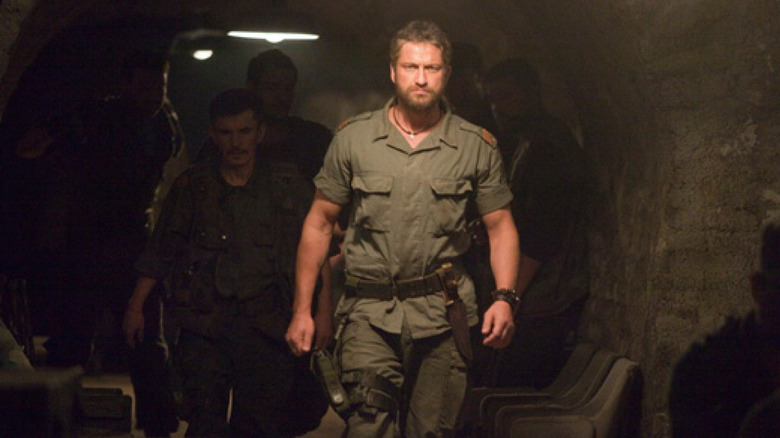
Lionsgate
Gerard Butler’s most acclaimed live-action film is “Coriolanus,” a 2011 Shakespeare adaptation directed by its star, Ralph Fiennes. This version of the classic play is set in present day Eastern Europe and features a glittering supporting cast, including John Kani, Jessica Chastain, Brian Cox, and — of course — Gerard Butler, who plays Tullus Aufidius.
The film is true to the themes and substance of the original text, but modernizes it with impressive action sequences (courtesy of Fiennes and Butler going at it like a pair of angry dogs) and stunning production design. This doesn’t just result in a great movie — it shows how Shakespeare’s themes have not lost any of their relevance.
Some critics dismiss Butler as a disposable action star, but “Coriolanus” proves he’s a versatile performer, able to accomplish any task … well, except for losing his Scottish accent. But if Sean Connery is allowed to play a Russian submarine captain in “The Hunt for Red October” without ditching his, then audiences should be fine with Butler’s distinct voice.